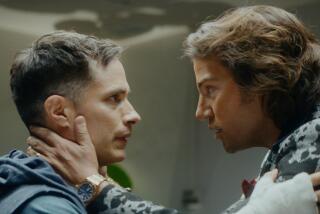Paolo Virzi steps out of comedic comfort zone in ‘Human Capital’
- Share via
Italian filmmaker Paolo Virzì has long been considered one of the heirs of the Commedia all’italiana style of film comedy made famous by such directors as Dino Risi, Mario Monicelli and Ettore Scola.
But Virzì noted that his films are much more than comedies. “It’s a trick,” he said. “I transform hard topics and sad stories into comedies.”
Though there are comedic moments in his latest film, “Human Capital,” Virzì steps out of his comfort zone with a far darker look at human nature.
Based on the novel by Stephen Amidon, the dramatic thriller unfolds in “Rashomon”-style chapters as it reveals what happens to two families after a cyclist is knocked off the road by an automobile on Christmas Eve.
Set in northern Italy during the financial crisis of 2010, “Human Capital” revolves around Dino Ossola (Fabrizio Bentivoglio), a man with impeccably bad hair, a pushy personality and a desperate desire to climb the social ladder. So he mortgages his house — unbeknown to his pregnant second wife (Valeria Golino) — to buy into the hedge fund run by slick investor Giovanni (Fabrizio Gifuni), whose oafish son is dating Dino’s daughter (Matilde Gioli).
“I was trying to focus on what was happening in our society and what is behind the consequences of the financial crisis on the everyday life of people,” said Virzì, who sometimes spoke in English and sometimes used the help of a translator. “In a certain sense, I was interested in doing something similar to what a detective novel is in America or England, where they are trying to talk about the malaise of contemporary society through the medium of the thriller.”
And just as with many detective novels, “Human Capital” opens with a prologue: The cyclist is hit by an unknown driver in a Jeep.
“That alerts the audience that we were going to deal with something dark and dramatic,” Virzì said.
With the first chapter of the movie centered on Dino’s fumbling attempt to join the upper class, the filmmaker signaled to the audience that he was going to combine black humor with social commentary.
“He is so stupid,” Virzì said of Dino. “He’s immature and believes in this idea you can get rich through shortcuts. He’s a terrible father. He is also naive. He thinks he’s a good family man.”
The most compelling chapter in “Human Capital” revolves around Carla (Valeria Bruni Tedeschi), the trophy wife of Giovanni. A fragile, clueless woman who once had aspirations of becoming an actress, Carla is unhappy and operates as if living in a cloud, unaware of her husband’s financial dealings or the fact that her son is an obnoxious oaf.
“She is a woman of the bourgeoise who is sort of hiding inside herself the dreams that she had in order to become a wife of a financial magnate” he said. “But inside she has this fragile, silly side.”
Carla marked the first time Virzì (“Caterina in the Big City,” “The First Beautiful Thing”) attempted to tell the story of an upper-class character in straightforward, serious terms.
“Usually in earlier films, when I tried to portray characters from the haute bourgeoise, I was much more sarcastic, much more biting and sometimes also aggressive,” he said. “And this time I was moved by the fragility of this woman. She is a woman who is very confused.”
An Italian novelist suggested Virzì look at Amidon’s 2004 novel “Human Capital,” which was set in Connecticut. “When I read it, I fell in love with it. The plot contained something very intense about the value of human life, but delivered without preaching, without explicit statement, but hiding the meaning in the plot. I admired that and the beautiful characters. I had to change many things to transfer the story to Italy.”
Amidon knew the book had received a positive critical reception in Italy, but he was still surprised to get a call from an Italian journalist in New York who said Virzì was interested in making the book into a movie.
“I couldn’t really get my mind around the whole idea,” Amidon said. “It is a very particular kind of novel. It’s American. It’s suburban. But Paolo was very effusive and gracious and communicative with me about what he wanted to do. By the time I finished talking to him, I was intrigued and enthusiastic.”
Virzì and fellow screenwriters Francesco Piccolo and Francesco Bruni, Amidon said, “did a great job of reorganizing the plot, but it’s still the same story and the same themes.”
More to Read
Only good movies
Get the Indie Focus newsletter, Mark Olsen's weekly guide to the world of cinema.
You may occasionally receive promotional content from the Los Angeles Times.











